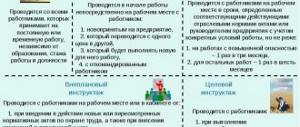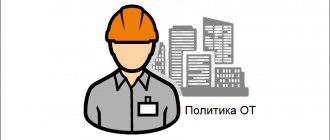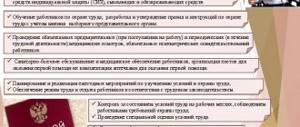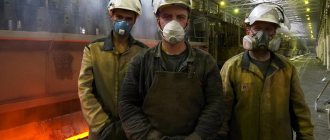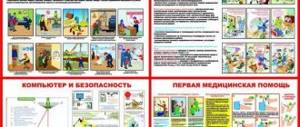30.08.2019
0
32
4 min.
At each enterprise, the concept of “labor safety” is necessarily discussed with a new employee, the issues of which are regulated by Article 225 of the Labor Code of the Russian Federation. A system that provides the conditions and requirements necessary to preserve the life and health of an employee is designated in this way. It is important to analyze the presented term in detail, since upon entering production, each employee undergoes an internship and receives instructions from the workshop foreman and other authorized persons.
About the types of briefings
There are several types of briefings that are carried out at enterprises, regardless of the field of activity. The following varieties are distinguished:
- Introductory. Necessary in all cases. This variety is intended for students who are undergoing practical training, for business travelers who come to previously unknown sites. The introductory part is also important for all new employees in companies where the labor protection system must be observed.
- Primary. Similar to induction, but carried out directly during the hiring of a new employee to the enterprise. It is carried out by managers or other authorized persons. New employees are introduced to the conditions and safety requirements approved by the company.
- Repeated or periodic. It is carried out during active work as needed or in accordance with the approved schedule. All employees, without exception, listen to the instructions. This is done to test existing knowledge on system issues and requires mandatory recording in a journal.
- Unscheduled. It is carried out only when necessary and when changes are introduced into the system. The purpose of such training is to notify all employees - current and trainees - of the new conditions. It is also clarified that training takes place if production was forced to stop for more than 2 months. Sometimes it is necessary to resort to an unscheduled study of conditions and requirements in situations where safety regulations are violated.
- Target. Instruction is required in situations where the company performs activities that are unusual for employees. These may involve additional operations using unfamiliar equipment.
Attention! The types of training fully characterize the purpose of its implementation. Shift foremen, shop supervisors or enterprise managers who have more than one year of work experience and have completed the appropriate “mentoring” courses are appointed responsible for briefings.
Article 225. Training in the field of labor protection
1. As follows from the provisions of Part 1 of the commented article, training of workers and testing of their knowledge of labor protection requirements must be carried out in the manner established by the federal executive body authorized by the Government of the Russian Federation, taking into account the opinion of the Russian Tripartite Commission for the Regulation of Social and Labor Relations. Before establishing the procedure for training workers on labor protection in accordance with the stated rules, the Procedure for training on labor protection and testing knowledge of labor protection requirements for employees of organizations, approved. by joint Resolution of the Ministry of Labor of Russia and the Ministry of Education of Russia dated January 13, 2003 N 1/29. This regulatory act is mandatory for execution by federal executive authorities, executive authorities of constituent entities of the Russian Federation, local governments, employers of organizations regardless of their organizational and legal forms and forms of ownership, employers - individuals, as well as employees who have entered into an employment contract with the employer.
Training of workers in labor protection involves conducting briefings on labor protection, training in safe methods and techniques for performing work and providing first aid to victims, on-the-job training, and testing knowledge of labor protection requirements.
The procedure for training in labor protection and testing knowledge of labor protection requirements for employees of organizations provides for introductory, primary, repeated, unscheduled, targeted briefings.
Introductory training on labor protection is carried out for all persons hired, as well as for those transferred to another job, workers seconded to the organization and employees of third-party organizations performing work in a designated area, students of educational institutions of the relevant levels, undergoing practical training in the organization, and others persons participating in the production activities of the organization. Instruction is carried out according to a program developed on the basis of legislation, taking into account the specifics of the organization’s activities and approved by the employer. Such instruction is carried out by a labor protection specialist or an employee who has been assigned these responsibilities by order of the employer (or a person authorized by him).
Initial briefing at the workplace is carried out before the start of independent work with all newly hired people in the organization, those transferred from one unit to another, business travelers, students and students, with employees performing new work for them, as well as with builders when performing construction and installation work on territory of the enterprise. Instruction is carried out with each employee individually and must include a demonstration of safe work practices. Initial on-the-job training is carried out by the heads of the organization's structural divisions.
Workers not involved in the operation, maintenance, testing, adjustment and repair of equipment, the use of electrified or other tools, the storage and use of raw materials and materials may be exempt from undergoing initial training at the workplace. The list of professions and positions of employees exempt from undergoing initial training at the workplace is approved by the employer.
Repeated briefing is aimed at increasing the level of knowledge of labor protection rules and instructions and is carried out individually or with a group of workers of the same profession (team) according to the workplace briefing program. All workers undergo such training at least every six months, with the exception of those who are not involved in the use of tools and equipment.
Unscheduled briefing is carried out: when new or amended legislative and other regulatory legal acts containing labor protection requirements, as well as labor protection instructions are introduced; when changing technological processes, replacing or upgrading equipment, devices, tools and other factors affecting labor safety; when employees violate labor safety requirements, if these violations create a real threat of serious consequences (industrial accident, accident, etc.); at the request of officials of state supervision and control bodies; during breaks in work (for work with harmful and (or) dangerous conditions - more than 30 calendar days, and for other work - more than two months); by decision of the employer (or his authorized person).
Targeted briefing is carried out when performing one-time work that is not directly related to the duties of the specialty (loading, unloading, cleaning the territory, etc.), when eliminating the consequences of accidents, natural disasters and work for which a work permit, permit or other is issued special documents, as well as when holding mass events in the organization.
Repeated, unscheduled and targeted briefings are carried out directly by the work manager (foreman, industrial training instructor, teacher).
The specific procedure, conditions, terms and frequency of all types of briefings on labor protection for employees of individual industries and organizations are regulated by the relevant industry and cross-industry regulatory legal acts on labor safety and health.
2. The employer is obliged not only to provide instructions on labor protection, but also to organize training in safe methods and techniques for performing work and providing first aid to victims. Training in safe methods and techniques for performing work for all persons entering work, as well as persons transferred to another job, must be organized by the employer within a month from the date of hiring or transfer to a new job of these persons.
When training workers in blue-collar professions and training them in other blue-collar professions, they are also trained in labor protection.
In addition, the employer must organize periodic, at least once a year, training for blue-collar workers to provide first aid to victims. Newly hired employees undergo training in providing first aid to victims within the time frame established by the employer, but no later than one month after hiring.
3. Persons entering work with harmful and (or) dangerous working conditions must undergo special training in safe methods and techniques for performing work. At the same time, the training of such persons must be organized with mandatory on-the-job training, passing exams, subsequent periodic training in labor protection and testing of knowledge during the work period. Workers in blue-collar professions who are new to these jobs or who have had a break in their profession (type of work) for more than a year undergo training and testing of knowledge of labor protection requirements within the first month after being assigned to these jobs.
Testing of theoretical knowledge of labor protection requirements and practical skills of safe work of blue-collar workers is carried out by immediate supervisors to the extent of knowledge of the requirements of labor protection rules and instructions, and, if necessary, to the extent of knowledge of additional special safety and labor protection requirements.
4. Managers and specialists of organizations undergo special training in labor protection. This training is carried out within the scope of job responsibilities upon entry to work during the first month, then - as necessary, but at least once every three years. Training in labor protection for managers and specialists of organizations is also carried out when improving their qualifications in their specialty.
Newly appointed managers and specialists of the organization are allowed to work independently after their employer familiarizes them with job responsibilities, including labor protection, with the local regulations in force in the organization that regulate the procedure for organizing work on labor protection, and working conditions at the facilities entrusted to them ( structural divisions of the organization).
Labor protection training for managers and specialists is carried out according to the relevant labor protection programs directly by the organization itself, which has a commission to test knowledge of labor protection requirements, or by organizations carrying out educational activities, if they have the appropriate document for the right to conduct educational activities, teaching staff specializing in in the field of labor protection, and the corresponding material and technical base. It should be noted that occupational safety training is carried out by organizations that have passed accreditation, the procedure for which is determined by Order of the Ministry of Health and Social Development of Russia dated 04/01/2010 N 205n “On approval of the list of services in the field of occupational safety, the provision of which requires accreditation, and the Rules for the accreditation of organizations providing services in the field of labor protection."
The Ministry of Labor of Russia develops and approves sample curricula and training programs on labor protection, including the study of intersectoral rules and standard instructions on labor protection, and other regulatory legal acts containing labor protection requirements.
5. The procedure for training in labor protection and testing knowledge of labor protection requirements for employees of organizations provides for regular and extraordinary testing of knowledge of labor protection requirements.
Managers and specialists of organizations undergo regular testing of knowledge of labor protection requirements at least once every three years.
An extraordinary test of knowledge of labor protection requirements for employees of organizations is carried out regardless of the period of the previous test in cases established by procedure (when introducing new provisions or making changes and additions to existing legislative and other regulatory legal acts containing labor protection requirements; when commissioning new equipment and changes in technological processes that require additional knowledge on labor protection for workers; when assigning or transferring workers to another job, if new duties require additional knowledge on labor protection, at the request of officials of the Federal Labor Inspectorate, etc.). The scope and procedure for an extraordinary test of knowledge of labor protection requirements are determined by the party initiating it.
Testing of knowledge of labor protection requirements for employees in organizations is carried out by a commission created by order of the employer to test knowledge of labor protection requirements, consisting of at least three people who have completed training in labor protection and testing of knowledge of labor protection requirements in the prescribed manner. The results of testing the knowledge of labor protection requirements of the organization's employees are documented in a protocol.
Training organizations can test the knowledge of occupational safety requirements only of those employees who have undergone occupational safety training.
An employee who has not passed the knowledge test of labor protection requirements during training is then required to undergo a second knowledge test within a period of no later than one month.
The employer is obliged to remove from work (not allow to work) persons who have not undergone training and testing of knowledge and skills in the field of labor protection in accordance with the established procedure. These persons are suspended from work (not allowed to work) for the entire period of time until the circumstances that served as the basis for removal from work or non-admission to work are eliminated (see commentary to Article 76).
Employees of organizations must be allowed to work only after undergoing training in fire safety measures, which is carried out by conducting fire safety briefings and passing the fire-technical minimum. The procedure and timing of fire safety training and passing the fire-technical minimum are determined by the head of the organization. Training in fire safety measures is carried out in accordance with regulatory documents on fire safety (clause 3 of the Fire Regulations in the Russian Federation, approved by Decree of the Government of the Russian Federation of April 25, 2012 N 390).
Training in fire safety measures for employees of organizations is carried out by the administration (owners) of these organizations (Article 25 of the Federal Law of December 21, 1994 N 69-FZ “On Fire Safety”). Fire safety requirements for organizing fire safety training for employees of organizations are established by the Fire Safety Standards “Training in fire safety measures for employees of organizations,” approved. By Order of the Ministry of Emergency Situations of Russia dated December 12, 2007 N 645.
To assist managers and specialists of organizations responsible for training employees in fire safety measures, developers of training programs in fire safety measures within the framework of fire safety briefings and fire-technical minimums, as well as representatives of federal executive authorities approving training programs for employees of organizations in the field of fire safety, The Russian Ministry of Emergency Situations has developed methodological recommendations for organizing training for managers and employees of organizations. Fire safety briefing and fire-technical minimum.
6. Training of employees in safe methods and techniques of work is carried out by the employer at his own expense.
As part of the preventive measures taken by the employer to reduce industrial injuries and occupational diseases of workers and sanatorium-resort treatment of workers engaged in work with harmful and (or) dangerous production factors, financial support is provided from the funds of the Social Insurance Fund of the Russian Federation (amounts of insurance contributions for compulsory social insurance against industrial accidents and occupational diseases, subject to transfer in the prescribed manner by the insurer to the Fund in the current financial year) employer expenses for labor protection training for certain categories of employees. These categories of workers include: heads of small business organizations; employees of small business organizations (with up to 50 employees), who are entrusted with the responsibilities of occupational safety specialists; heads (including heads of structural divisions) of state (municipal) institutions; managers and specialists of labor protection services of organizations; members of labor protection committees (commissions); authorized (trusted) persons for labor protection of trade unions and other representative bodies authorized by employees (see Order of the Ministry of Labor of Russia dated December 10, 2012 N 580n “On approval of the Rules for financial support of preventive measures to reduce industrial injuries and occupational diseases of workers and sanatorium and resort treatment of workers occupied in work with harmful and (or) hazardous production factors").
The implementation in 2014 of financial support for preventive measures to reduce industrial injuries and occupational diseases of workers and sanatorium-resort treatment of workers engaged in work with harmful and (or) dangerous production factors are provided for by Federal Law of December 2, 2013 N 322-FZ “On budget of the Social Insurance Fund of the Russian Federation for 2014 and for the planning period of 2015 and 2016” (subclause 5, clause 1, article 7).
7. Monitoring the timely testing of knowledge of labor protection requirements for workers, incl. managers and organizations is carried out by the federal labor inspectorate.
In accordance with Part 1 of Art. 357 of the Labor Code, state labor inspectors have the right to issue orders to remove from work persons who have not completed training in safe methods and techniques for performing work, labor safety instruction, on-the-job training, and testing of knowledge of labor safety requirements in accordance with the established procedure.
At the level of constituent entities of the Russian Federation, conducting, in the prescribed manner, training on labor protection for workers, including heads of organizations, as well as employers - individual entrepreneurs, testing their knowledge of labor protection requirements, as well as conducting training in providing first aid to victims at work, instruction on labor protection, On-the-job internships are organized by the executive authorities of the constituent entities of the Russian Federation in the field of labor protection (Part 6 of Article 216 of the Labor Code).
Training and examination
The type of training presented is a method of transferring safety knowledge that all employees of the enterprise must become familiar with, except for those who are required to undergo inspection. The list of employees includes a technologist, a foreman, a welder, an operator and others. The purpose of the exercise is to prevent injuries and accidents. They are trained within a month from the first working day immediately after starting work at the enterprise.
Conduct training in safe methods at the site of future work activity - or in special centers and schools. All requirements can be found in Decree 1/29 of January 13, 2003.
Comments to Art. 225 Labor Code of the Russian Federation
The Labor Code of the Russian Federation is the main document of labor relations. On its basis, federal laws, regulations and other regulations are developed. Labor protection is represented by section X, with 4 chapters and 29 articles. So …
Art. 225 of the Labor Code of the Russian Federation is entirely devoted to occupational safety training. More specific requirements are established by Regulation 1/29, industry rules, and local regulations. The provisions of any of these documents must not contradict the requirements of Art. 225.
Article 225 of the Labor Code of the Russian Federation states:
- All employees are required to undergo occupational safety training. This also applies to top officials of organizations - directors, rectors, chief managers, etc. Individual entrepreneurs who use hired labor (i.e. act as employers) also train themselves (as first persons) and organize it for employees.
- Training and testing of knowledge on labor protection is carried out according to special procedures. They are established by federal executive authorities. Locally, the nuances of these orders may vary, but in general their provisions should not contradict Art. 225. Labor Code of the Russian Federation.
- Responsibility to instruct employees. In the second paragraph of Art. 225 states that the employer is obliged to instruct any employee on occupational safety requirements, first aid rules, and also train him to work safely. This task is posed specifically to the employer, because the employee will not be able to complete it on his own. Even if you have the maximum qualifications in your profession (for example, the highest category), the employee should become familiar with the features of a particular production, products, tools and materials that are used during the production process. Therefore, according to Labor Code 225, Art. such training is organized by the employer, who has all the necessary information.
- Training and internship of employees who will come into contact with industrial hazards and hazards. Before giving a newly hired employee the opportunity to work for the benefit of the organization, the employer is obliged to organize appropriate training and internship for him, and then a knowledge test. The internship takes place on the job. Training is carried out repeatedly. The first time - upon admission to the staff, then - at the frequency specified by Regulation 1/29 and industry rules.
- State assistance in the field of occupational safety training to organizations that carry out educational activities. State assistance in this regard can be very different, for example, financing training centers, creating special commissions in which “state employees” will test knowledge for free. The state also trains occupational safety specialists - develops and implements professional standards, trains such specialists in universities, and provides opportunities for advanced training.
About the timing of the inspection
The above Resolution additionally specifies the timing of the safety knowledge test. The following requirements are distinguished:
- New employees are examined during the first month of employment at the enterprise. The worker first undergoes an internship, after which he must justify the acquisition of knowledge during this period of time.
- If employees have undergone appropriate training at a center or specialized educational institution, their knowledge is tested immediately upon completion of the course.
- If an employee has not worked in his usual field practiced at the enterprise for a year, he must pass an exam one month after resuming work.
- Companies often practice unscheduled exams, which are necessary to test the knowledge of current employees regarding safety precautions. Sometimes the reason for this is an emergency that happened to an employee, resulting in injury or death.
It is important to know! Each manager has the right to independently conduct unscheduled re-examinations for workers if the situation at the enterprise requires it.

